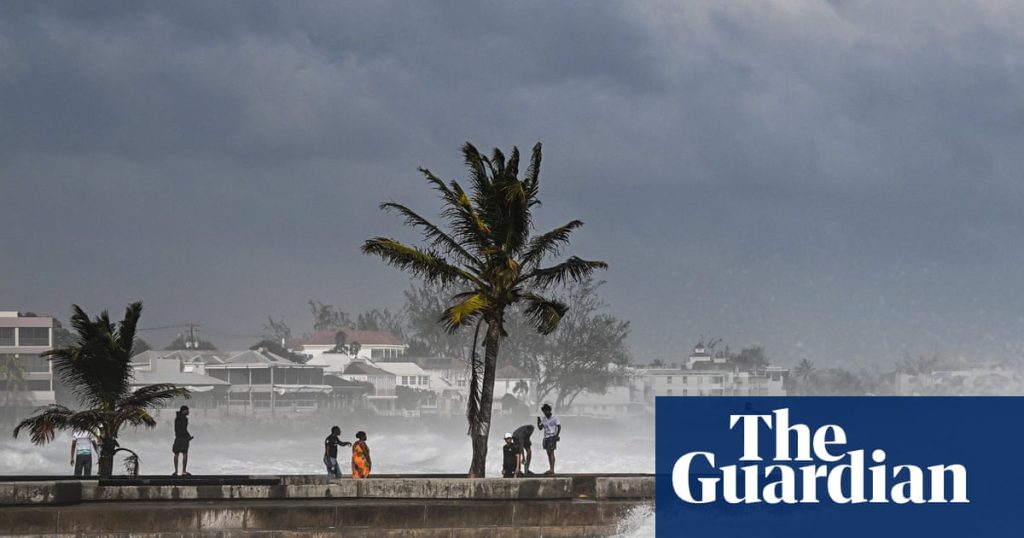Leaders in the Caribbean have hailed the outcome of the international court of justice (ICJ) climate change case as a “historic legal victory” for small island states everywhere.
Several countries in the region had provided evidence to the ICJ case, which ended this week with a landmark advisory opinion that could see states ordered to pay reparations if they fail to tackle fossil fuels and prevent harm to the climate system.
Describing the opinion as a “historic legal victory for small states” that are bearing the worst impacts of climate change, the prime minister of St Vincent and the Grenadines (SVG), Ralph Gonsalves, told the Guardian it would strengthen the Caribbean’s negotiating power.
“What is very interesting is that it says that the obligations laid out in the important [climate change] treaties are not simply procedural,” he said. “They create substantive legal obligations.”
In recent years the Caribbean has been plagued by a string of catastrophic hurricanes. Last year Hurricane Beryl demolished more than 90% of buildings in parts of multi-island SVG and left thousands homeless and without running water, electricity and food.
Gonsalves said the advisory opinion – which said a clean, healthy and sustainable environment is a human right – connects climate action treaties such as the Paris agreement to other international laws such as those governing human rights.
Echoing Gonsalves’ sentiments, the Bahamas’ attorney general, Ryan Pinder, praised the ICJ for taking a “very strong position” that allowed countries to “speak and argue about the adverse effects of the climate crisis on its people” and potentially provided more legal options to small states.
“It certainly opens up the positions of … states like the Bahamas to go into other areas of the United Nations and other multilateral institutions that are human rights-focused,” he told the Guardian.
Referring to the catastrophic Hurricane Dorian in 2019, which killed more than 70 people and caused an estimated US$3.4bn worth of damage, Pinder said: “[This] had a significant impact on the human rights of our people, whether that be displacement … the right to an adequate standard of living … [or] access to food, water and housing.
“All of those are fundamental human rights that the ICJ has now recognised as a significant component of the adverse effects of climate change.”
The advisory opinion’s focus on reparations, he said, was important for the Bahamas, because it was about the obligation of major polluters to restore a country and its assets if it suffered the effects of a climate change-related disaster.
Human rights and climate justice lawyer Nikki Reisch said it was possible to connect devastating climatic events to climate change and to the states responsible and pursue justice.
“The science on attribution and causation is strong and only getting stronger. The court made clear that there is no technical barrier to connecting climate destruction to its causes, to the continued pollution from fossil fuels and destruction of carbon sinks,” she said.
“The science is there, and this decision confirms that the law is too.”
Reisch added that countries were responsible for past and present environmental breaches.
“The court really rejected the attempts of the biggest cumulative emitters like the United States and others to sweep history under the rug and ignore the decades of climate destruction, of fossil fuel production and pollution, of colonialism that laid the foundations for the devastation that climate change is wreaking in so many parts of the world.”
In the UK, some MPs criticised the ICJ opinion, with the shadow foreign secretary, Priti Patel, describing it on X as a “mad” decision, adding that the ICJ had “lost its core purpose and is now joining political campaigns and bandwagons”.
Dr Justin Sobion, who coordinated the Caribbean’s ICJ submissions, said the opinion was an interpretation of climate obligations under international law, including global agreements that countries such as the UK – which recognise there is a climate emergency – have ratified.
Pinder said: “I’m not sure, given some of the commentary we’ve seen from larger developed countries and countries that were in the Industrial Revolution, that [the ICJ advisory] is really going to change their opinions.”
He added that the “rather unfortunate” comments from some political leaders in the UK on the ICJ opinion indicated that “multilateralism is still going to be a significant challenge”.
Pinder and Gonsalves said their countries were reviewing the ICJ opinion – which UN member states instructed the ICJ to produce in 2023 after years of campaigning by Pacific island law students and diplomacy led by Vanuatu – and considering how to work with other countries in the region on next steps.
“This has given us an excellent platform,” Gonsalves said. “We have … to follow through with some heavy lifting, to do negotiations. At the end of the day, this is about life, living and production for all of us on planet Earth.”

